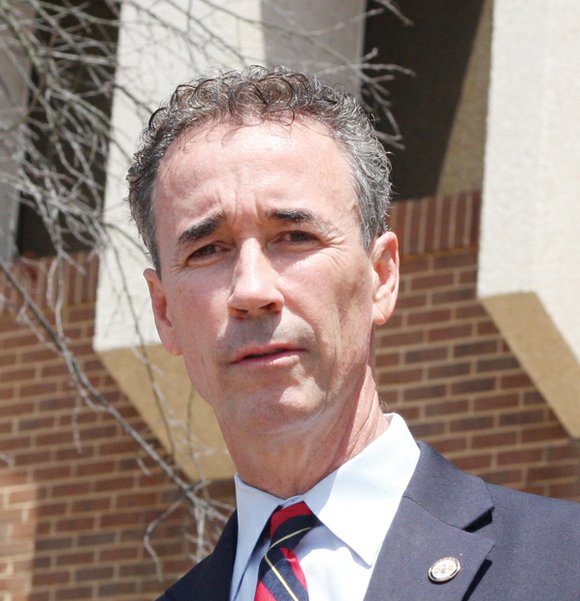Morrissey strikes out in court
Jeremy M. Lazarus | 4/16/2015, 8:06 a.m.
Joseph D. “Joe” Morrissey is striking out on his own again to run as an independent in his bid to win a state Senate seat.
On Tuesday, a Richmond judge rejected Mr. Morrissey’s request for court intervention to allow him to challenge his disqualification from the June 9 Democratic Party primary election in the 16th Senate District. that stretches from Richmond’s East End to Petersburg.
Mr. Morrissey gave up his Henrico seat in the House of Delegates and moved into an apartment in Richmond’s Shockoe Bottom with plans to challenge the 16th District’s current senator, Rosalyn R. Dance of Petersburg, for the party’s nomination.
The Senate district stretches from Richmond to Petersburg and includes the city’s East End and parts of Hopewell and the counties of Chesterfield, Dinwiddie and Prince George.
As he left court, a disappointed Mr. Morrissey said that he would file as an independent.
“Voters deserve to have the choice,” he said.
However, he did not completely rule out a long-shot attempt to bring his case back to Richmond Circuit Court to consider whether state law requires the state Board of Elections to hear an appeal of his disqualification as a primary candidate.
Mr. Morrissey expected trouble from the Democratic Party and supporters of Sen. Dance when he sought to be a candidate in the primary in the heavily Democratic district.
Much of the state Democratic Party’s hierarchy regards him as a pariah because of his misdemeanor conviction in December for contributing to the delinquency of a minor. He served 90 days in a Henrico County jail on work release.
Still, he seemed headed to the ballot until the state Democratic Party disqualified him for failing to submit the required 250 signatures of qualified registered voters to get on the Senate primary ballot. Another potential challenger, Derik E. Jones, a Richmond School Board member and son of Mayor Dwight C. Jones, also was disqualified for the same reason.
Sen. Dance and outgoing Petersburg Delegate Joseph E. Preston, who replaced Sen. Dance in the House, are the only candidates whom the party certified as qualified to run in the primary.
Retired Circuit Court Judge Melvin R. Hughes turned down Mr. Morrissey’s plea for a temporary injunction to block the printing of primary ballots and for an order to have the party review 39 signatures of voters he claims were wrongly thrown out, though the party and state board contested that claim as unsupported by the law or evidence.
Mr. Morrissey submitted more than 1,000 signatures, but the state Democratic Party accepted only 222 as valid, based on a review of the signatures by the Richmond Registrar’s Office. That left him 28 signatures short to qualify for the primary ballot.
He went to court after the state party rejected his request to appeal the decision of the senate district’s nominating committee, telling him potential candidates have no right to an appeal hearing even if valid signatures are not accepted.
Under its plan, the state Democratic Party only permits a member of a party nominating committee to ask for an appeal for a disqualified candidate, and none of the members of the 16th Senate District committee made such a request.
The state Board of Elections claims that it has delegated its authority to the major parties to determine their primary candidates and has no role in the process.
However, a state law passed in 2013 provides for an appeal to the state Board of Elections for any candidate who is denied a place on a primary or general election ballot for lack of enough valid signatures. The only exception is for party nominees, who do not have to file signatures. Mr. Morrissey is not a party nominee.
Judge Hughes did not address the legal issues that Mr. Morrissey raised. Instead, the judge dismissed the request for a temporary injunction after Mr. Morrissey was unable to call any witnesses, including voters whose signatures were thrown out.
“You, as a candidate, do not have a constitutionally protected right to be on the ballot,” the judge told Mr. Morrissey.
Judge Hughes indicated that the party’s appeal process was adequate and seemed to side with the attorney general’s office that Mr. Morrissey’s recourse was to run as an independent candidate.







